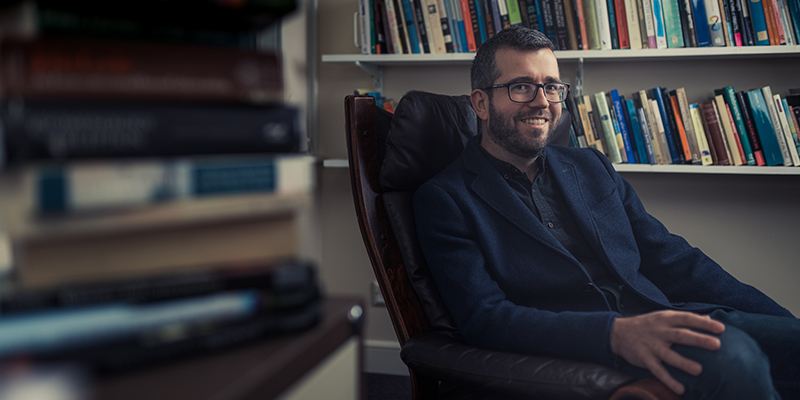
Academic and postgraduate members
The Centre for the History of Philosophy is an inter-disciplinary centre with members from a variety of different universities and disciplinary backgrounds.
Our members' work and teaching covers a wide range of historical philosophy topics. Find out more about their research interests, work and publications, or get in touch using the details below.
Contact us
If you would like to contact us please email Dr James Clarke.
Dr James Clarke
| Name | University | Research interests |
|---|---|---|
| Jeremy Dunham | University of Durham | Idealism; Pragmatism; 18th and 19th-century French philosophy. |
| Clare Mac Cumhaill | University of Durham | Women in the history of analytic philosophy (especially Elisabeth Anscombe, Philippa Foot, Mary Midgley, and Iris Murdoch); Stumpf; Husserl. |
| Joe Saunders | University of Durham | Ethics and agency in Kant and the post-Kantian tradition. |
| Emily Thomas | University of Durham | History of metaphysics, from the mid 17th to the early 20th-century. |
| Elisabeth Thorsson | University of Durham | The relationship between theology and politics in 17th century Europe; Locke, Damaris Masham, Anne Conway. |
| Sara Uckelmann | University of Durham | History of logic, especially history of modal logic and women in the history of logic. |
| Nick Jones | University of Leeds | Early Modern Philosophy, especially Berkeley; Schopenhauer; Nietzsche. |
| Panayiota Vassilopoulou | University of Liverpool | Ancient, Hellenistic, and Late-Antique Philosophy. |
| Rachael Wiseman | University of Liverpool | Women in the history of analytic philosophy (especially Elisabeth Anscombe, Philippa Foot, Mary Midgley, and Iris Murdoch); Wittgenstein. |
| Joshua Fortenzer | University of Sheffield | American Pragmatism (especially John Dewey). |
| Angie Hobbs | University of Sheffield | Ancient Greek philosophy (including its reception in the Renaissance and the First World War), and ethics from classical thought to the present. |
| Komarine Romdenh-Romluc | University of Sheffield | The phenomenological tradition, especially Merleau-Ponty and Fanon. |
| Robert Stern | University of Sheffield | Nineteenth century post-Kantian German philosophy, especially Hegel; K. E. Løgstrup; Martin Luther. |
| Keith Allen | University of York | The early modern period, including Locke and Cavendish, and the phenomenological tradition, particularly Merleau-Ponty. |
| Jim Chamberlain | University of Sheffield | Early modern philosophy with a close focus on Hume, especially his theories of moral judgement, the passions, and automatic causal reasoning. |
| James Clarke | University of York | Rousseau; Post-Kantian practical philosophy, especially Erhard and Fichte. |
| Tim Stuart-Buttle | University of York | 17th to 18th-century philosophy, from Hobbes to Hegel, with a particular focus on the perceived social, political, and moral consequences of mankind's desire for esteem and recognition. |
| Anna Ezekiel (Honorary Fellow) | University of York | Post-Kantian German philosophy; German romanticism; Historical women philosophers, particularly Karoline von Gunderrode. |
| Owen Hulatt | University of York | Spinoza's metaphysics; Hegel's aesthetics and social philosophy; Adorno's critical theory; Althusser's Marxism. |
| Sarah Hutton | University of York | History of early modern philosophy and intellectual history; the Cambridge Platonists (Ralph Cudworth and Henry More); women philosophers (Anne Conway, Margaret Cavendish, Damaris Masham, Emilie du Châtelet). |
| Tom Stoneham | University of York | Berkeley, Margaret Cavendish, Arthur Collier, Richard Burthogge and Edward, Lord Herbert of Cherbury. |
| Andrew Ward | University of York | Hume and Kant. |
| Pavel Reichl | University of Groningen | Kant and post-Kantian philosophy; Early modern philosophy; Latin American philosophy. |
| Tom Fawcett | Postgraduate researcher, University of Sheffield | Nietzsche and the pre-Socratics. |
| Roderick Howlett | Postgraduate researcher, University of Sheffield | The Frankfurt School; Kierkegaard and Adorno. |
| Barney Riggs | Postgraduate researcher, University of Sheffield | Kierkegaard. |
| Thomas Dowling | Postgraduate researcher, University of York | Critical Theory; Hegel; Lukács. |
Contact us
If you would like to contact us please email Dr James Clarke.
Dr James Clarke